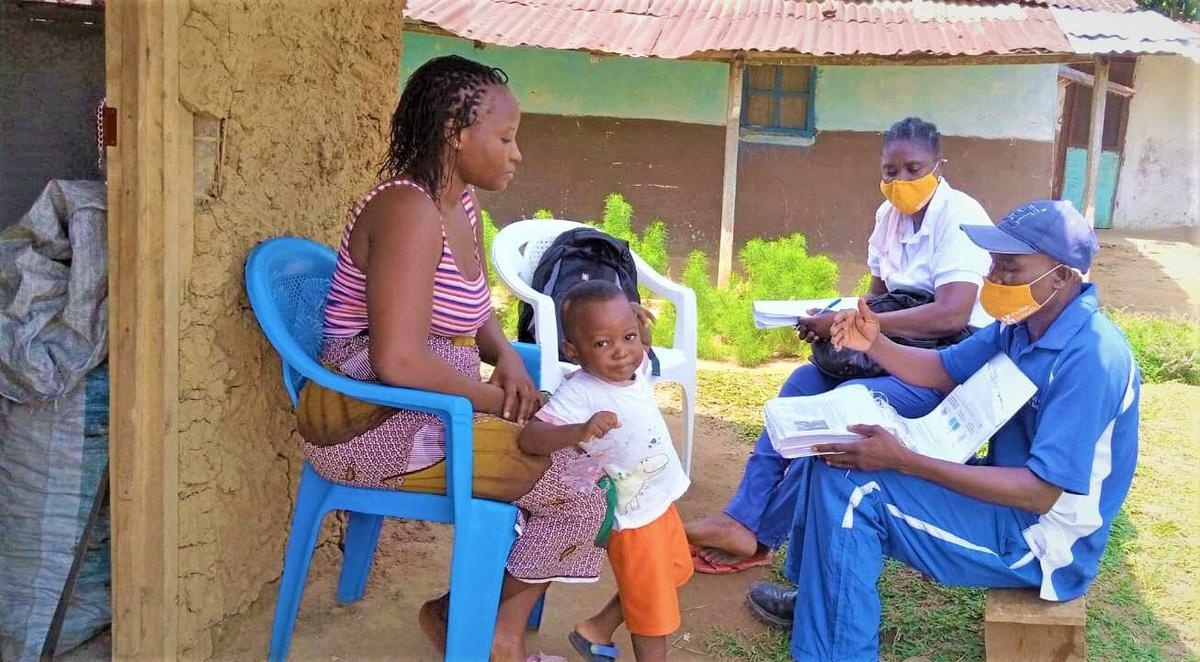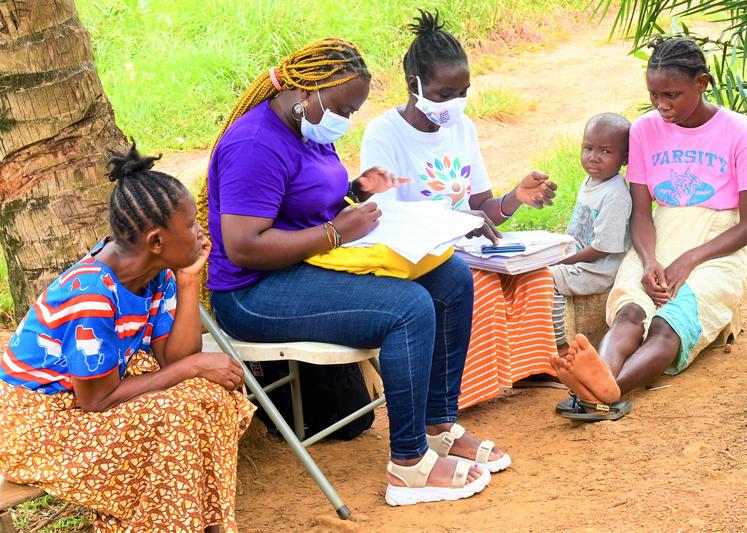Advancing the Community Health Worker Program in Liberia
PIH pilot guides government’s new nationwide strategy
Posted on Apr 3, 2023

When the national community health worker program launched in Liberia in 2016, the Ministry of Health prioritized patients living more than five kilometers from the nearest health facility–about 29% of the population.
In an effort to reach more patients and improve the quality of care, Partners In Health (PIH) Liberia ran a pilot program from September 2018 to March 2020 providing services to those living within five kilometers of PIH-supported J.J. Dossen Memorial Hospital in Harper, Maryland County, a largely rural region in the southeast.
During that time, community health workers visited more than 10,000 households. Those visits helped link 3,177 people with care, of which more than 500 were diagnosed with malaria—a mosquito-borne disease that requires timely linkage to treatment. In a follow-up survey among participating households, nearly all respondents reported that the community health workers treated them respectfully and listened to their challenges and concerns.
The success of the program caught the attention of the government.
“We gave our results to the Ministry of Health and they were so excited about it. They incorporated our ideas into a new, revised policy and strategy plan,” says Lassana Jabateh, PIH Liberia’s community health program director. “We’re making sure that Liberia has a community health program with a strategy covering [all] communities.”
The new strategy, which aims to accelerate progress toward universal health coverage, was announced in late March at the Third International Community Health Workforce Symposium, a global gathering created to share ideas and solutions to sustain community health programs. Key takeaways from the pilot program, including recruitment, remuneration, training processes, and supervisory structure, will serve as a model for future programs across Liberia—and beyond.

An Essential Role
Community health workers are essential members of the health system in rural Maryland County and Liberia at large. They visit dozens of patients daily; screen them for various diseases, including HIV, tuberculosis, and leprosy; and refer—and often accompany—at-risk and symptomatic patients to the hospital.
Through referrals, patients diagnosed with HIV or tuberculosis receive social support provided by PIH Liberia staff in the form of stipends, housing, transportation, and a food package with rice, beans, sardines, vegetable oil, and more.
“And the reason why we do that is we have to win,” says Jabateh. “We have to weigh the situation of not [offering social support]. If you don’t…they may die.”
There’s currently more than 140 community health workers, peer supervisors, and nurses, who work within the 5-kilometer area surrounding J.J. Dossen Hospital, the largest referral facility in the district. Across the country, there are more than 5,300 community health workers, supervisors, and nurses. Together, they ease the burden on already-strained healthcare facilities and provide patients with more accessible services.
Looking Back
The community health worker program in Liberia launched after the Ebola outbreak in 2016, after PIH began working in the country. With guidance from the World Health Organization and other partners, PIH played a key role in initiating the program. When developing the road map with the Ministry of Health, the ministry initially chose to focus on patients in rural areas far away from health facilities where most illnesses and maternal deaths occurred.
In the early stages, the national community health worker program was successful but fragmented. Some initiatives focused on malaria, while others focused on HIV. Some had no clear direction. In some locations, employees were called “general community health workers” and in others, they were called “community health volunteers” or “community health assistants.”
Overall, there wasn’t a standard curriculum or work structure. PIH recognized this and encouraged the ministry to take steps to create a consistent program. Jabateh supported the ministry to develop a road map that led to the development of a five-year policy and strategic plan. Simultaneously, he and others recognized that the success of the program should reach people across the entire country.
“The Liberian government has recognized [PIH] as one of the strongest partners when it comes to community health,” he says.
With new strategies and policies, PIH and partners are confident that standardized processes and supervisory structure will support the national scale-up of the already successful community health worker program—providing lifesaving care to thousands of patients every year.

